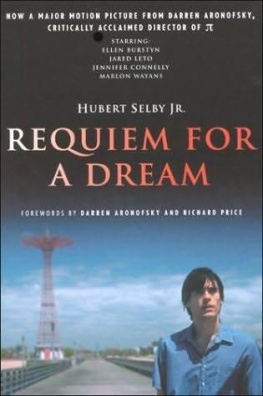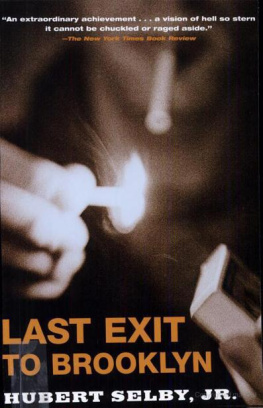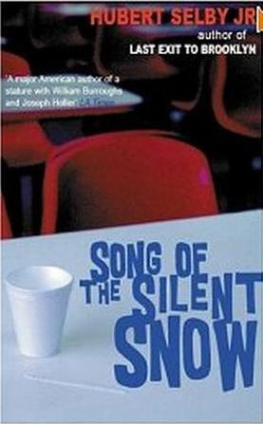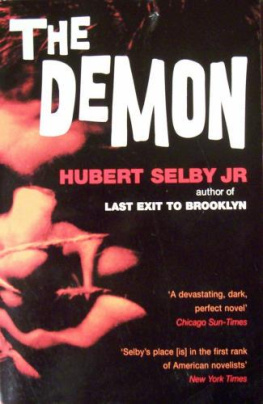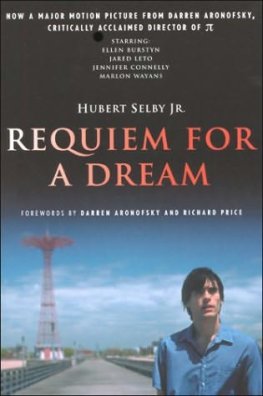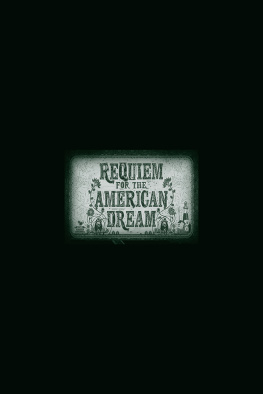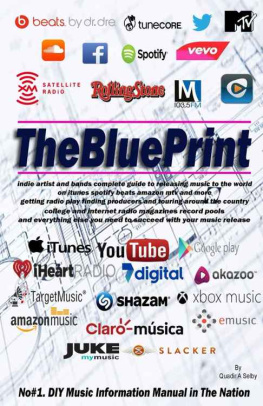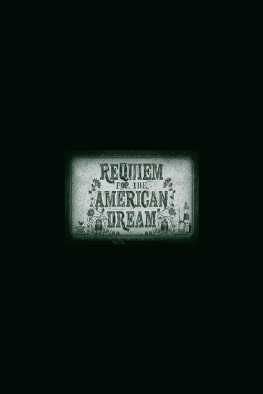Hubert Selby Jr. - Requiem for a Dream
Here you can read online Hubert Selby Jr. - Requiem for a Dream full text of the book (entire story) in english for free. Download pdf and epub, get meaning, cover and reviews about this ebook. year: 2000, publisher: Da Capo Press, genre: Detective and thriller. Description of the work, (preface) as well as reviews are available. Best literature library LitArk.com created for fans of good reading and offers a wide selection of genres:
Romance novel
Science fiction
Adventure
Detective
Science
History
Home and family
Prose
Art
Politics
Computer
Non-fiction
Religion
Business
Children
Humor
Choose a favorite category and find really read worthwhile books. Enjoy immersion in the world of imagination, feel the emotions of the characters or learn something new for yourself, make an fascinating discovery.
- Book:Requiem for a Dream
- Author:
- Publisher:Da Capo Press
- Genre:
- Year:2000
- Rating:4 / 5
- Favourites:Add to favourites
- Your mark:
- 80
- 1
- 2
- 3
- 4
- 5
Requiem for a Dream: summary, description and annotation
We offer to read an annotation, description, summary or preface (depends on what the author of the book "Requiem for a Dream" wrote himself). If you haven't found the necessary information about the book — write in the comments, we will try to find it.
Requiem for a Dream — read online for free the complete book (whole text) full work
Below is the text of the book, divided by pages. System saving the place of the last page read, allows you to conveniently read the book "Requiem for a Dream" online for free, without having to search again every time where you left off. Put a bookmark, and you can go to the page where you finished reading at any time.
Font size:
Interval:
Bookmark:
REQUIEM FOR A DREAM
ANOVEL BY
HUBERT SELBY, JR.
THUNDER'S MOUTH PRESS
NEW YORK
This book is dedicated, with
love, to Bobby, who has found
theonly pound of pure--
Faith in a LovingGod.
Preface 2000 by Hubert Selby, Jr.
Foreword 2000 by Darren Aronofsky
Foreword 1988 by Richard Price
Copyright 1978, 1988 by Hubert Selby, Jr.
All rightsreserved
Published in the United States by Thunder's Mouth Press
An Imprint of Avalon Publishing Group Incorporated
161William Street, 16th Floor
New York, NY 10038
Gratefulacknowledgment is made to the New York State Council on the Arts and
the National Endowment for the Arts for financial assistance withthe publication of this work.
Library of CongressCataloging-in-Publication Data
Selby, Hubert.
Requiem for aDream: a novel ' by Hubert Selby, Jr.
p. cm.
ISBN1-56025-248-0
FOREWORD
When I was in high school, I thought you had to bedead to be a novelistdead, and from somewhere else: England, theMidwest, France.
One of the more profound, if peripheral, epiphanieshitting me upon reading Last Exit to Brooklyn by Hubert Selby, Jr.,was that my working-class Bronx world was valid material for Art;that the voices, the streets, the gestures that I knew so well wereas human, as precious, and as honorable as any found through thecenturies and civilizations of literature.
Which is to say that I set down Last Exit to Brooklynwith the terrifying realization that if I had the will and the talentto go with the eye and ear, I could grow up to be a writer.
It wasn't until I was much older that I realized thattalent and material mean nothing without something else that Selbypossesses and projects on every page of every book he has written:Lovea forgiveness and compassion that elevate all the bottom dogsthat populate his world, the lost, the depraved, these coldblooded,and the insensate. His art is his ability to humanize the seeminglyinhuman, and by extension to humanize the reader.
No one can convey the visceral experience of thesuffering of people like Selby-the cruel hallucinations of grace, ofpeace, of love, of Easy Street; the wracking ache of junk sickness;the choking rage of parental-marital-sexual claustrophobia; thetightening screws of paranoid delusion; the pathetic grandiosity ofwalk-around dreams; and the dread of the inevitable dawn.
Selby burrows under the skin and into the brains ofthe urban underclass to deliver infernal monologues seething withtragically skewered delusions, short-term ecstasies, and obsessivefuries that crash and boil across the page, ceaselessly. At his best,he can literally stun us into empathy.
Requiem for a Dream tracksthe destruction of four people-three young, and one older. Here,Selby reports from the marrow of those addicted: to dope, to hope, totragically childish visions of heaven on earth. Even as itscharacters ascend to the heights, their nightmarish plummet can beforeseen, but this foreknowledge doesn't protect the reader fromexperiencing the almost unbearable suffering, the degradation andoblivion, that is the price of dreams among the powerless.
Requiem for a Dream isquintessential Selby, fueled by moments which make the reader feellike the unwilling newscaster witnessing the Hindenburg disaster whosobbed, "Oh, the humanity!"
It is Selby's gift to us that once again we findourselves aching for his peoplewhich is to say we find ourselvesloving the unlovable.
Richard Price
New YorkCity
January 1988
PREFACE TOTHE NEW EDITION
Requiem for a Dream was originally published in 1978.It is extremely gratifying to know that it is still in print andgoing into another edition. Also, it is being made into a film,production scheduled to start the middle of April this year. So thebook still lives and breathes (as do I).
For me there is something beautiful and ironic in thefact that all this is happening now, during a time of "unparalleledprosperity." The Great American Dream is coming true for many.Obviously, I believe that to pursue the American Dream is not onlyfutile but self-destructive because ultimately it destroys everythingand everyone involved with it. By definition it must, because itnurtures everything except those things that are important:integrity, ethics, truth, our very heart and soul. Why? The reason issimple: because Lifelife is giving, not getting.
I am not suggesting we need to give everything to thepoor and homelessthe millions of them who are still here in themidst of plentyput on a hair shirt and go through the streets witha begging bowl. This, in and of itself, is no more nurturing than thepursuit of "getting." I am not afraid of money and what itcan buy. I would love to have a house full of stuffof course Iwould need a house first. I have been hungry and see nothing noble mhunger. Neither do I see anything noble in eating high on the hogthough eating is certainly better. But to believe that getting stuffis the purpose and aim of life is madness.
It seems to me that we all have a dream of our own,our own personal vision, our own individual way of giving, but formany reasons we are afraid to pursue it, or to even recognize andaccept its existence. But to deny our vision is to sell our soul.Getting is living a lie, turning our back on the truth, and Visionsare glimpses of the truth: Obviously nothing external can trulynurture my inner life, my Vision. What happens when I turn my back onmy Vision and spend my time and energy getting the stuff of theAmerican Dream? I become agitated, uncomfortable in my own skin,because the guilt of abandoning my "Self-self," ofdeserting my Vision, forces me to apologize for my existence, to needto prove myself by approaching life as if it's a competition. I haveto keep getting stuff in an attempt to appease and satisfy that vaguesense of discontent that worms its way through me.
Certainly not everyone will experience this torment,but enough do and have no idea what is wrong. I'm sure thepsychologists have a term for this free-floating anxiety, but thecause is what is destroying us, not the classification. There arealways millions who seem to get away with doing the things that wethink abominable, and thrive. It certainly appears that way. Yet Iknow, absolutely, from my experience, that there are no free lunchesin this life, and eventually we all have to accept full and totalresponsibility for our actions, everything we have done, and have notdone.
This book is about four individuals who pursued TheAmerican Dream, and the results of their pursuit. They did not knowthe difference between the Vision in their hearts and the illusion ofthe American Dream. In pursuing the lie of illusion, they made itimpossible to experience the truth of their Vision. As a resulteverything of value was lost.
Unfortunately, I suspect there never will be arequiem for the Dream, simply because it will destroy us before wehave the opportunity to mourn its passing. Perhaps time will prove mewrong. As Mr. Hemingway said: "Isn't it pretty to think so?"
Hubert Selby, Jr.
LosAngeles
1999
FOREWORD TOTHE NEW EDITION
I was a public school kid from Brooklyn facing myfirst exams during freshman year of college, and I was terrified.High school was a joke. The only thing I learned was how to get awaywith cutting class. So, when college came around I wasn't veryprepared. I hit the library and tried to learn.
But Selby fucked everything up.
Out of the corner of my eye I saw the word"Brooklyn." Now when you're from Brooklyn and you seeanything related to Brooklyn you're immediately interested. I pulleda worn copy of Last Exit to Brooklyn off the shelf. This was beforethe movie, and I had no clue what I was holding. From sentence one Iwas done, and so were my finals. I blew them off and I read. I readand I read and I screamed and I connected and I recited and Irejoiced. This was storytelling. This was understanding. This was adeep yet simple examination of what makes us human. I now knew what Iwanted to do. I wanted to tell stories.
Next pageFont size:
Interval:
Bookmark:
Similar books «Requiem for a Dream»
Look at similar books to Requiem for a Dream. We have selected literature similar in name and meaning in the hope of providing readers with more options to find new, interesting, not yet read works.
Discussion, reviews of the book Requiem for a Dream and just readers' own opinions. Leave your comments, write what you think about the work, its meaning or the main characters. Specify what exactly you liked and what you didn't like, and why you think so.

